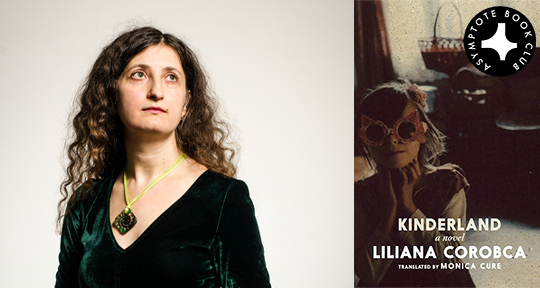First published in 2013, Liliana Corobca’s Kinderland links modern Moldova to the metaphysics of magical thinking, bridging the chasm between socio-political reality and children’s play. The second novel to emerge from Corobca and Monica Cure’s writer-and-translator duo, Kinderland follows the acclaimed The Censor’s Notebook, which earned Cure the 2023 Oxford-Weidenfeld Translation Prize; it colors in The Censor’s Notebook’s negatives of political repression, probing the social legacies proliferating in the long shadow of communism through the tangential prism of a young girl’s imagination.
The Asymptote Book Club aspires to bring the best in translated fiction every month to readers around the world. You can sign up to receive next month’s selection on our website for as little as USD20 per book; once you’re a member, join our Facebook group for exclusive book club discussions and receive invitations to our members-only Zoom interviews with the author or the translator of each title.
Kinderland by Liliana Corobca, translated from the Romanian by Monica Cure, Seven Stories, 2023
From the German, Kinderland: children’s land, land for children, the country of children, the children’s state. But also: winterland, wonderland, Alice, wanderland. Liliana Corobca’s original Romanian title for Kinderland refracts its light onto the novel’s substance, and Monica Cure’s English translation draws on an exquisite textual structure, sensitively conveying its narrator’s preternatural style of creative contemplation.
Beyond the third person opening sequence, no section of the novel is over six pages long; they follow the irreverently earnest voice of Cristina, a young girl caring for her two siblings in her parents’ absence, and is directly addressed to a shifting “you”. Throughout, page breaks are forfeited, constructing a visual configuration that reposes on Corobca’s and Cure’s craft as writers and sustaining an undialectical, seemingly uncontrolled style that recalls the meanderings—and moral certitude—of one’s own twelve-year-old introspections. These ruminations and recollections are a succession of light exposures, spanning the summer of Cristina’s thirteenth year, and each resembles a photograph, a vignette of latent action that flows into the memory or emotion at its blurred peripheries. Kinderland’s loose-limbedness articulates Cristina’s coming-of-age in limpid textuality, impressed on a textual emulsion milky with village childhood.
Kinderland’s omniscient “proemium” also preaches on speed, instructing the reader on how to plumb Cristina’s fragmented essence from the novel’s brevity: “Quickly, everything’s done quickly. Wash it quickly. . . if you wash the stain quickly, it comes out easily.” And Cristina, in particular, inhabits the same spiritual and wondrous landscape as Lady Macbeth (she and her brothers play in woods as otherworldly as Birnam Wood). From a cinematic, bird’s-eye view, Kinderland’s incipit glides the reader over the country of children. With her parents elsewhere, she looks after “two brothers, a dog, a cat, a pig, ten chickens, a scrappy rooster. . . the last thing I needed with this entire army was a bunch of goats.” She, Dan, and Marcel live in an atavistic, almost pre-technological village of wells and wool and walnuts, but beneath their daily corporeality flower a sensuous realm of fleawort, wounds, and witchcraft. READ MORE…

